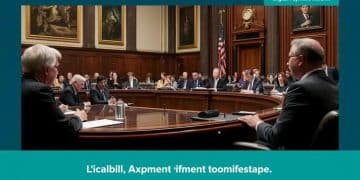2025 regulations cap credit card late fees

Anúncios
The 2025 regulations cap credit card late fees, protecting consumers by preventing excessive charges and promoting financial responsibility through increased transparency in credit agreements.
2025 regulations cap credit card late fees, changing the financial landscape significantly. Have you wondered how these changes could affect your wallet? It’s essential to stay informed about how these regulations might impact your spending habits.
Anúncios
Understanding the new credit card regulations
Understanding the new credit card regulations is crucial for everyone who uses credit cards. These regulations aim to make credit card use more transparent and fair.
One of the key elements of these new regulations is the capping of late fees. As of 2025, credit card companies will have to adhere to strict limits on how much they can charge for late payments. This change is designed to protect consumers from excessive charges that can lead to financial distress.
Anúncios
Why These Regulations Matter
The introduction of cap credit card late fees is a significant step for consumer protection. It ensures that late charges remain reasonable and manageable. This regulation can prevent a snowball effect that occurs when high late fees accumulate, leading to overwhelming debt.
- Protects consumers from exorbitant fees
- Encourages responsible credit card use
- Improves financial literacy among cardholders
Moreover, these regulations seek to enhance the clarity of credit card agreements. With clearer terms and conditions, consumers can make better-informed decisions regarding their credit usage. This transparency can lead to improved financial health as cardholders are less likely to fall into traps of confusing fee structures.
Further Implications of the Regulations
As the credit card landscape changes, it is essential to understand how these regulations will impact overall financing. The hope is that with a cap on late fees, credit card companies will compete by offering lower interest rates and better rewards. This competition can lead to more favorable conditions for consumers.
- Potential for lower interest rates
- Increased competition among credit card issuers
- Enhanced rewards programs
Ultimately, the 2025 regulations aim to create a more equitable and sustainable environment for credit card users. By understanding these changes, consumers can take charge of their financial journeys without the fear of unnecessary fees and debt.
Impact of late fee caps on consumers
The impact of late fee caps on consumers is significant and far-reaching. These regulations are designed to provide relief and fairness in the credit landscape.
By capping late fees, the new regulations help prevent consumers from facing overwhelming financial burdens. Many people have experienced late fee charges that stack up quickly, leading to a cycle of debt. With the implementation of these caps in 2025, consumers will see a decrease in the potential financial pitfalls associated with credit card use.
Benefits of Capped Late Fees
One of the primary benefits of capped late fees is improved financial stability for consumers. These caps can help ensure that individuals can manage their expenses better and avoid falling into deep debt due to high penalty fees.
- Encourages timely payments
- Reduces overall debt burden
- Promotes better financial planning
Furthermore, this reform fosters a healthier relationship between consumers and credit card companies. With fewer penalties, customers may feel more empowered to use their credit cards responsibly. When consumers know they have some protection against excessive fees, they may use their cards more cautiously.
Long-Term Financial Effects
Over time, the impact of late fee caps will create a more educated consumer base. People will become more aware of their financial rights and obligations. This education can lead to smarter credit card use and more informed decisions.
- Enhances consumer knowledge
- Encourages accountability in spending
- Supports financial literacy initiatives
As consumers adapt to these changes, they may notice that their overall credit scores improve. Lower late fees reduce the likelihood of missed payments impacting credit ratings negatively. With healthier credit scores, consumers will have more access to better loans and credit options.
How to manage credit card payments effectively

Managing credit card payments effectively is vital for maintaining a healthy financial life. With the new regulations, knowing how to navigate your payments can save you both money and stress.
One effective strategy is to set up automatic payments. By scheduling recurring payments, you can ensure that your bills are paid on time, reducing the risk of late fees. Even if you can’t pay the full balance, paying at least the minimum can help you avoid penalties.
Understanding Your Payment Options
There are various ways to manage credit card payments effectively. Understanding each option can help you choose what fits your budget and lifestyle.
- Paying the full balance each month to avoid interest
- Making biweekly payments to lower your balance faster
- Using a budgeting app to track payment dates and amounts
Furthermore, keeping an eye on your spending is essential. Regularly reviewing your statements can help you identify unnecessary expenses and adjust your habits. This awareness can lead to better financial choices.
Utilizing Payment Reminders
Setting reminders on your phone or calendar can help you stay on top of your bills. This simple step ensures you won’t forget to make a payment. Many banks offer notification services that alert you a few days before the due date.
- Email reminders from your bank
- Mobile app alerts for payment due dates
- Custom calendar events for scheduled payments
Additionally, if you find yourself struggling to manage multiple cards, consider consolidating your payments. Using one card for most purchases can simplify your budgeting and reduce the complexity of keeping track of payments.
Trends in credit card fees leading to 2025
Trends in credit card fees leading to 2025 are shaping how consumers interact with credit providers. Understanding these trends can help users make informed financial decisions.
One significant trend is the increasing transparency regarding fee structures. Credit card companies are now required to disclose information clearly, allowing consumers to see exactly what they will be charged. This clarity benefits consumers by minimizing hidden fees and unexpected charges.
Emergence of Reward Programs
Another trend is the rise of reward programs that are more user-friendly. Consumers are seeking credit cards that offer tangible benefits, such as cash back or travel rewards. With the cap on late fees, credit card companies may compete by enhancing these offers.
- Enhanced cash back options
- Flexible reward points
- Lower annual fees with more perks
Additionally, the adoption of digital wallets and mobile payment options is driving changes in credit card usage. As technology evolves, consumers prefer using virtual cards that can quickly process transactions with minimal fees.
Impact of Regulatory Changes
The regulatory landscape is also shifting, with upcoming regulations set to address not just late fees but other charges as well. There may be a push for limits on annual fees and foreign transaction fees, making credit more affordable for everyone.
- Prospective caps on annual fees
- Elimination of foreign transaction fees for certain cards
- Increased competition among credit card issuers
As we progress toward 2025, these trends indicate a more consumer-friendly environment in the credit card market. By keeping an eye on these changes, consumers can choose credit options that suit their financial needs.
Advice for consumers on adapting to new laws
Advice for consumers on adapting to new laws surrounding credit cards is essential as 2025 approaches. Staying informed can significantly improve your financial management and protect you from potential pitfalls.
First, it is crucial to read the terms of your credit card agreements carefully. Familiarizing yourself with the new regulations, including capped late fees, will help you understand how these changes affect your finances. Being aware of what you can and cannot be charged is the first step toward responsible credit use.
Monitor Your Statements Regularly
Another important strategy is to regularly monitor your credit card statements. Checking for errors or unexpected charges can help you address issues promptly. Make it a habit to review your statements every month to ensure you know where your money is going.
- Look for unauthorized transactions
- Track your spending patterns
- Ensure fees align with new regulations
Also, consider setting up alerts for your payment due dates. Many credit card companies offer notification services via email or text. These alerts can help you avoid late payments and keep your credit score intact. Utilize mobile apps that allow you to set reminders and track your payments easily.
Educate Yourself about Financial Literacy
Investing time in financial literacy can also be beneficial. Understanding how credit works, the implications of debt, and the importance of timely payments can transform your credit habits. Take advantage of online resources, workshops, or community seminars focused on finance.
- Follow reputable financial blogs
- Attend local financial literacy workshops
- Use educational apps promoting money management skills
By staying proactive and informed, consumers can adapt to the evolving credit landscape while maximizing benefits and minimizing the costs associated with credit cards.
FAQ – Frequently Asked Questions about Credit Card Regulations
What are the new regulations regarding late fees?
The new regulations set caps on late fees, ensuring they are reasonable and manageable for consumers.
How can I monitor my credit card statements effectively?
Regularly reviewing your statements helps you identify unauthorized charges and manage your spending.
What should I do if I can’t pay my credit card bill on time?
If you can’t pay on time, try to at least make the minimum payment to avoid penalties and keep your account in good standing.
How can financial literacy help me with credit card usage?
Understanding financial concepts allows you to make informed decisions about your credit usage, helping you avoid debt and improve your overall financial health.






